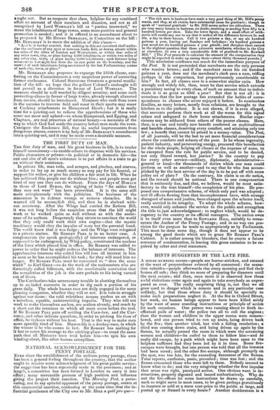THE FIRST DUTY OF MAN.
TUE first duty of man, and his great business in life, is to render himself unnecessary—to enable others to dispense with his services. Public characters or private—in political or in domestic life—the end and aim of all men's existence is to put affairs in a train to go on without their assistance.
In private life, man toils, and scrapes, and pinches, and starves, in order to lay up as much money as may pay for his funeral, or aupport his widow, or give his children a fair start in life. When he has achieved this, people can do without him ; and people soon get tired of any one they can do without. From the days of HORACE to those of Lord BYRON, the sighing of heirs "for sables that they may not wear" has been proverbial. It is the same still more conspicuously with the politician. The business of the statesman is to redress wrongs or remove obstacles. He is wanted till he accomplish this, and then he is shelved with- out ceremony. After the Whigs had carried the Reform Bill, it was not long before the suspicion arose that the bill might work or be worked quite as well without as with the assist- ance of its authors. Desperately they strove to convince the world that they only could work their own engine—that the mystic machinery would obey the impulse of none but the parental hand. The world knew that it was fudge ; and the Whigs were relegated to a private station. Sir ROBERT PEEL is in no better case. A conglomerate (to speak geologically) of interests endangered, or supposed to be endangered, by Whig policy, constituted the nucleus of the force which placed him in office. Sir ROBERT was called to power in order that he might redress the balance of interests. The apprehensive interests who called him will lose all interest in him as soon as he has accomplished his task ; for they will need him no longer. Sir ROBERT PEEL must be contented to " dree the same wierd" as Earl GREY—to do the work of the taskmasters who are flatteringly called followers, with the comfortable conviction that the completion of the job is the sure prelude to his being turned out of doors.
The Carthusians take unnecessary trouble in abutting themselves up in secluded convents in order to dig each a portion of his grave daily. The whole human race are daily engaged in the same pleasing occupation, whether they will or not. It is vain to struggle against our doom : the cold relentless Aver?) pushes us on with a noiseless, equable, unintermitting impulse. They who will not work to make themselves useless, are useless already, and reach by a short cut the terminus to which all must come before the rest. If Sir ROBERT PEEL puts off settling the Corn-law, and the Cur- rency, and other delicate questions, in order to prolong his time of office, he reckons without his host. That is the way to make men more speedily tired of him. Human life is a donkey-race, in which the winner is he who comes in last. Sir Rossar has nothing for it but to screw his courage to the sticking-place—to tread the saute path that all Ministers have trod before him—to spin his own winding-sheet, like other human caterpillars.


























 Previous page
Previous page